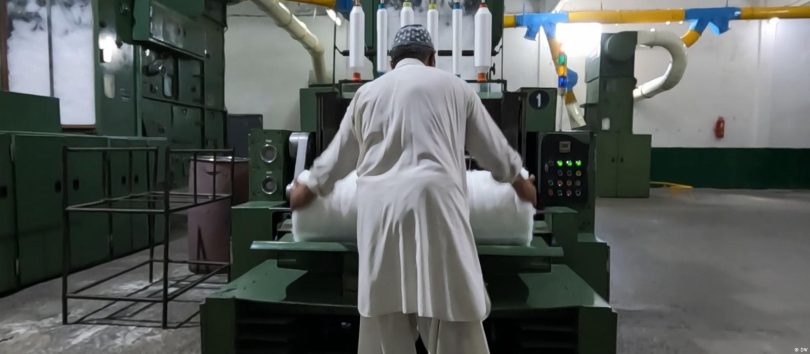[ad_1]
For Ashraf Ali, a textile laborer in the Pakistan’s textile hub of Faisalabad, losing his job was as if his entire life had come crashing down around him.
“I was laid off from my job from Sitara Textiles, Faisalabad, due to the cotton shortage in the country. I had given 24 years of my life to this company and being laid-off was highly depressing,” Ali, a 42-year-old worker and a father of seven children, told DW.
Ali is just one of around 7 million people who have recently been fired from their jobs in Pakistan’s textile industry, according to textile associations. Once a thriving sector of economy, it now struggles with low exports amid a deepening crisis.
A large portion of the cotton crop was destroyed by the devastating floods last year. The floods resulted in the death of more than 1,700 people and affected 33 million more, but also caused billions of dollars of material damage and dealt a serious blow to the country’s economy.
Raw materials stuck in Karachi port
Pakistan is one of the world’s leading textile producers. Its textile exports stood at $19.3 billion (€17.8 billion) in 2021 and made up for over half of the country’s exports overall. But many of Pakistan’s small textile mills and manufacturing units that produce bedsheets, towels and denim for consumers in Europe and the US are now shut down due to the cotton shortage. On top of that, the industry has to contend with a recent tax hike.
The timing of the dip is also alarming — it comes as cash-strapped Pakistan is struggling with high inflation and dwindling currency reserves amid the tough International Monetary Fund (IMF) program.
Due to the government-imposed restrictions, the textile industry is unable to procure necessary raw materials and is failing to fulfill international orders.
Thousands of shipping containers with raw materials, medical equipment and food items have been stuck at Karachi port due to dwindling foreign exchange reserves. According to the State Bank, Pakistan’s foreign exchange reserves last week fell to $4.3 billion, their lowest levels since February 2014.
Islamabad is hoping to end the deadlock with the IMF and negotiate the release of $1.1 billion in loans that have been pending since September. This is a part of a larger $7 billion loan agreed with the global lender in 2019.
Salaries go unpaid
Labor unions are now protesting against the mass layoffs in the textile industry and demanding that workers be given their unpaid salaries.
“Nearly 50% of the industry is closed in Faisalabad and the remaining are working on alternate shifts,” Latif Ansari, head of the Labour Qaumi Movement union, told DW.
“Nearly 500,000 workers have lost their jobs in Faisalabad and adjoining areas while nearly a million others are at the verge of losing their jobs,” Ansari said.
Ali’s wages are still pending with the Sitara Textiles. Two weeks ago, he protested along with hundreds of others workers outside the mill, but he says he is “not hopeful” about receiving his remaining pay.
More exports in the spring?
Meanwhile, textile exporters warn that overseas orders for the coming summer are down and the domestic markets are also in decline.
“Hundreds of small manufacturing mills are shutting down at a rapid pace across the country. Their operations are suspended due to high fuel costs and energy issues,” Khurram Mukhtar, patron-in-chief of the Pakistan Textile Exporters Association, told DW.
But Mukhtar believes exports will pick back up in March.
“The apparel sector has already received strong and consistent bookings and most of the factories are pretty booked from March to June. We demand consistency in government policies, enabling business environments and full implementation of the five-year textile policy. Government should ease working capital constraints of Pakistani exporters,” said Mukhtar.
“Slowdown in the textile sector is a global phenomenon, Pakistan has a strong textile value base and the longest textile exports experience. The exports slowed down in the last quarter, however, since retailers are able to offload extra inventories they were carrying in the holiday period,” he told DW.
Textile associations call on US ambassador to step in
Economic analyst Farhan Bokhari told DW that “the government must immediately resolve the deadlock with the IMF” in order to end economic uncertainty, and also engage with textile producers on solving import and credit issues.
At the same time, Muhammad Amjad Khawaja from Pakistan Hosiery Manufacturers and Exporters Association in Faisalabad linked the downfall of the textile industry with political tensions.
“The political polarization in the country is immensely damaging the business and economy. There is no business confidence amid the widening political tensions in the country and buyers are insecure,” Khawaja told DW.
Last month, the All Pakistan Textile Mills Association (APTMA) called on Prime Minister Shehbaz Sharif to intervene.
“A very substantial number of jobs have already been lost and many more are to follow if remedial measures are not urgently undertaken,” APTMA’s Patron-in-Chief Gohar Ejaz said in a letter.
Ejaz has also written a letter to the American ambassador in Islamabad requesting him to arrange a loan of $2 billion dollars for Pakistan to import cotton. Ejaz also urged Washington to announce concessional loans for Pakistan’s textile industry.
Edited by: Darko Janjevic
[ad_2]
Source link








